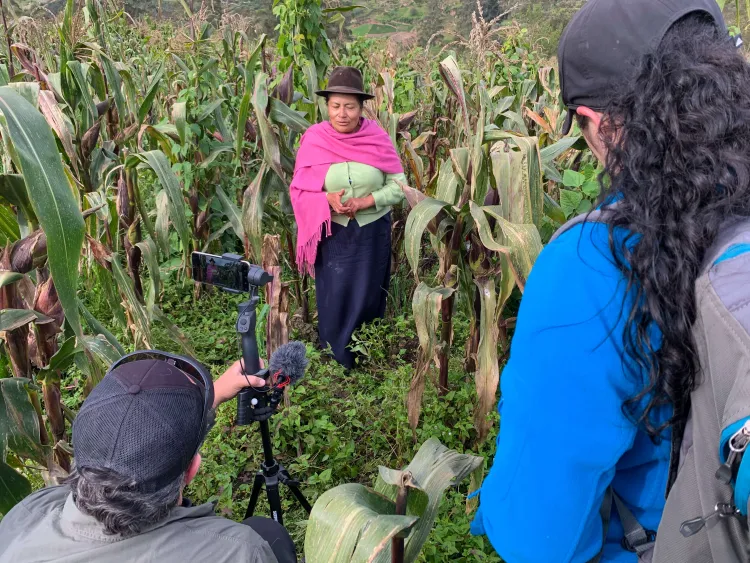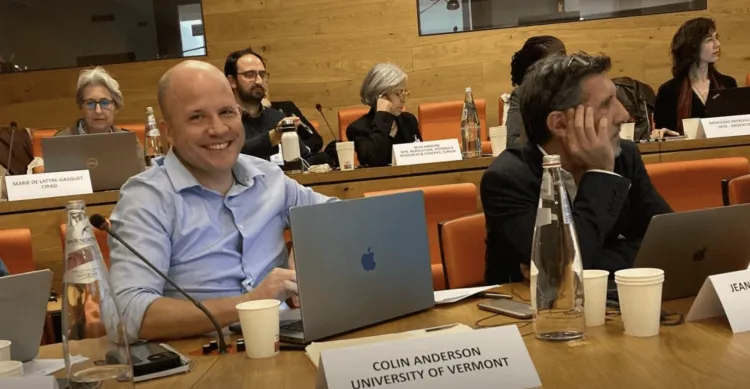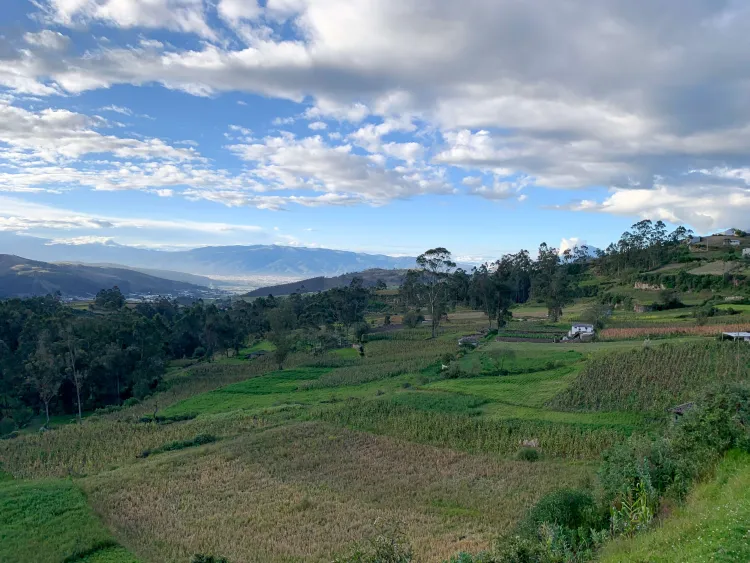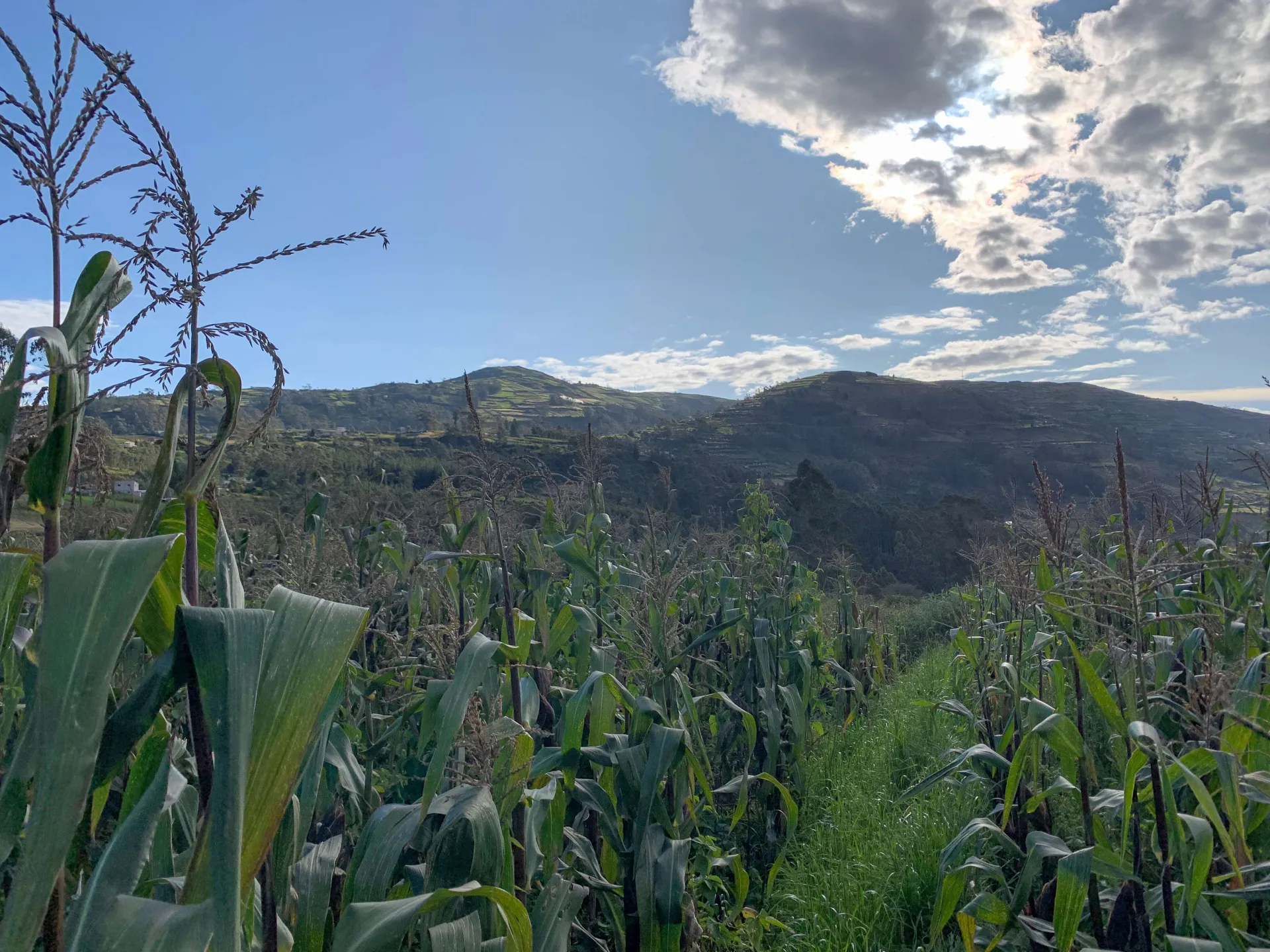Agroecology Can Build a More Resilient Future
Alarming news items come at us every day, with reports of climate-driven catastrophes, extreme flooding and raging wildfires, biodiversity loss and mass extinction, the devastation of the world’s forests and oceans, and a staggering 700 million people facing hunger every day filling our news feeds.
But what these stories often overlook is that these crises don’t happen independently of one another. Climate chaos and ecological destruction are interconnected and are symptoms of deeper underlying system faults that stem from the same root causes. The over-exploitation of ecosystems and people, wrought by unbridled corporate power; the lack of rights for the most marginalized communities (women, indigenous and youth), whose knowledge and commitment to protect their ecosystems are vital, yet rarely considered; and the deep inequities in our socio-economic systems all perpetuate a system that prioritizes profit of people and extraction over resilience. With six of the nine planetary boundaries breached, we know that we’re in a state of deep crisis.
Yet, communities the world over haven’t given up the fight for a more just, equitable, and resilient future. From the global south to the streets of the United States, advocates, parents, workers, and everyone in between are joining together to dismantle and rebuild systems that prioritize their needs and create the conditions for them to thrive. This is especially true for those working to reimagine and reconstruct how food is grown, harvested, and supports the livelihood of communities and landscape.
Food Systems as Drivers of Change
International experts have drawn a clear picture of our food systems as a major driver of these interlinked problems. The way we grow, transport, consume and waste our food leaves a huge climate and ecological footprint, which is indisputably negative. For example, the role of fossil-fuels in our food system is deeply entrenched within the entire process with petrochemical inputs present throughout each stage of packaging, transport, retail, and waste.
Additionally, we support an unjust food system that disenfranchises those who grow our food, creates health related burdens and obesity for many, and leaves a small portion of the world ‘stuffed’ with overabundant food access while a much larger global population is ‘starved’ from lack of access to adequate, nutritious food. Nowhere is this more visible than in our own backyard of North America – the cradle of intensive, industrial agriculture. Increasingly dominated by fewer large companies and large-scale farmers, they benefit from government subsidies, enabling policies, and a research agenda that favors industrial, export-oriented agriculture.
All of this leaves little room for small family farmers in the US, who are ageing and seeing their profit margins increasingly squeezed by rising input prices while farm debt mounts unbearably. Tough economic and climate uncertainties make it impossible for them to keep a grip on the family farm, let alone envision a sustainable farming future. Meanwhile, in the global South, hundreds of millions of family farmers experience even harsher barriers, particularly those practicing agroecology. They receive almost no policy or financial support for practicing sustainable agriculture, while dealing with unjust terms of trade and climate shocks.
At the same time, we see hope that the food system can be the solution. Family farmers, food movements and agroecology proponents are articulating a very different vision of community-led, diverse and multi-functional farms and food procurement. These visions are nested in local markets that provide healthy food, meaningful livelihoods and economic prosperity for all. They directly confront the narratives and monopolistic tactics of agribusiness which control the input, production, retail and distribution markets.

Agroecology Creates Resilient Food Systems
A need for tackling interconnected problems through a holistic, multidimensional and transdisciplinary lens, is precisely the reasons why interest in agroecology has grown tremendously around the world.
Agroecology can help turn around food systems from being the creator of significant problems to the driver of powerful solutions.
First, by starting from a place of plenty and diversity (rather than a place of scarcity and monoculture), it elevates a farmers’ role as an innovator and co-creator of solutions rather than mere cogs of a large machine. As a whole-system science and practice, agroecology cuts across disciplines to mimic natural processes and create synergies that have multi-functional impacts across the food system, as well as the economy and society-at-large. Furthermore, agroecology is much more than science – it is practice and movement. By embracing it as a guiding principle, it strengthens the power of family farmers, Indigenous Peoples and local communities who work the land by valuing their knowledge systems and cultural practices, and encouraging ‘food sovereignty’ over their land and territories, waters and seeds.
Ultimately, agroecology is key to strengthening systems resilience, because it asks us to think in systems – from the means of food production based on ecological diversity, to the shorter, low carbon pathways of a territorial market, to the emphasis on the agency and ‘food sovereignty’ of family farmers and food producers as key rights and knowledge holders in food systems. This systemic lens is essential to tackling interlinked problems together, to move towards transformation and resilience. As the recently launched report - Building Resilient Food Systems - from the UN High Level Panel of Experts on Food Security and Nutrition (HLPE-FSN) of the Committee on World Food Security (CFS), of which IFA co-director, Colin Anderson, was part of the drafting team, states - “Agroecology involves a holistic approach that integrates ecological, social, cultural and political dimensions to transform food systems, and provides comprehensive solutions that emphasize ecological integrity alongside the rights of those most exposed to uncertainties, shocks and stresses."

UVM Helps Grow Agroecology Networks, North and South
Those of us working with the UVM Institute for Agroecology find ourselves in a unique place - continuing our longstanding engagement and support to the work of international agroecology and food sovereignty movements, and cross-fertilizing them with the like-minded spaces and alliances in North America that are growing fast.
Agroecology opens up many pathways for seeding transformation right here at home. Through various participatory action research programs and applying agroecology principles to work with the land, it lifts farming out of its tedium. Farmers can move back to acting as co-creators in relationship with the land and their communities, rather than merely users of inputs, or pawns in an exploitative system.
This especially strikes a chord with young farmers and agrarian researchers, whether they are working in the green mountains of Vermont’s Northeast Kingdom, building community and economy around agrarian principles and ethos, or on the hillsides of Honduras, using participatory research to produce new varieties of beans and corn that can adapt to the quickly changing climate realities of the region. Applying ingenuity gives farmers not only meaning, but also agency.
This is particularly important when one considers the demographics of farming. In North America, for example, the average farmer is 57-years-old, and a transformative change is needed to attract new generations to agriculture. Moreover, countries in the global South are experiencing a massive draining of their rural populations, as young people flock to cities or search for destinations in the global North, exacerbating a migrant crisis.
And while the work at UVM may not be considered 'unique' on other continents, any action makes an impact with so few institutions in North America supporting agroecology research and academic programming.
Finally, it’s vital to be aware of our outsized ‘extraterritorial’ impact in an interconnected world. In other words, what we do here in North America has an impact far beyond our borders.
Therefore, we have a deep responsibility to act in solidarity with movements who are shielding farmers from negative extraterritorial impacts of American agriculture and trade policies.
Part of this work looks like leveraging our positionality, and the unspoken ‘legitimacy’ it offers, to support the demands of those most often marginalized, especially on an international level. Whether that’s attending and supporting the goals of the 3rd Nyéléni Global Forum 2025 like IFA Researcher Martha Caswell, leveraging resources to change the narrative around resilience through publications like Rooted Magazine, influencing the strategy and reports of international governing bodies like the HLPE-FSN like IFA Co-Director Colin Anderson, or actively participating in the Food and Agriculture Organization of the United Nations like other IFA Co-Director Ernesto Mendez, honoring our commitment to those on the ground is essential.
In a post-COVID society increasingly marked by alienation, political fragmentation and distance from nature, agroecology brings us back to the meaning, belonging and connections that we’ve lost. For new generations and for students, this itself is transformative, personally and professionally. But we must take it a step futher, especially in North America, and leverage our resources, perceived legitimacy, and any other means to work in solidarity with communities around the world to ensure that the meaning, belonging, and connection-making is available for everyone.
_
Faris is a consultant in sustainable food system based in Ottawa, Canada.

